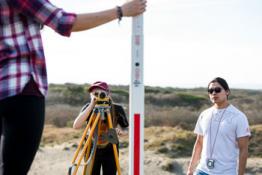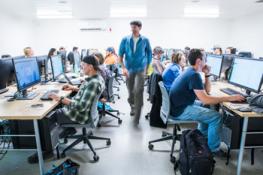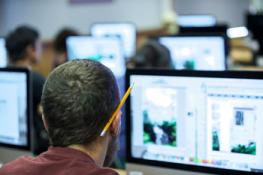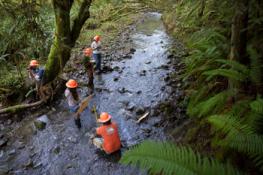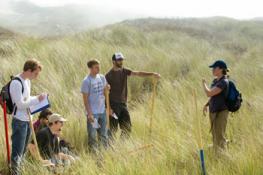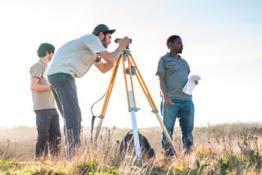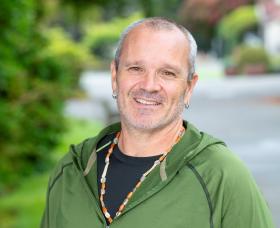Daniel Lipe, Ed.D.
Assistant Professor - Indigenous Science
I am a registered Western Band Cherokee member and my research and teaching explores the intersections between Indigenous and Western sciences. I was born and raised in Klamath Falls, Oregon and spent the majority of my time hunting and fishing the upper Klamath River Basin. I have worked and taught for over 25 years, both in the classroom and in higher education programs that serve Indigenous and other underrepresented groups. My research interests are within Indigenous land restoration and decolonizing Indigenous food systems. Many of the courses I have taught focus and identifying ways to reconnect with our environmental systems through relational accountability and holistic perspectives that include diverse understandings of resource management. I spent the last 18 years living in Hawai’i learning from and working alongside Indigenous scholars and cultural practitioners of Hawai’i. This work focused primarily on ahupua’a enhancement and restoration projects that incorporated both Indigenous and western science understandings. Being back in Pacific Northwest where I was born and raised, and living and working within the Klamath River watershed, I am looking forward to building relationships once again with the Indigenous peoples of Northern California and helping facilitate ways to Indigenize Cal Poly Humboldt furthering its commitment to becoming an Indigenous serving institution.
Specialty Area
My specialty area lies within the intersection of Indigenous and Western science worldviews and how these understandings can be utilized to enhance and reconnect us to the spaces and places that nourish and sustain us all. This work is done through on the ground participatory action research projects centered on understanding Indigenous relational accountability through Traditional Ecological Knowledge and experiential learning.
Teaching
My classroom is a forum where students can come to share their stories. It is a place where students learn to become critical thinkers not only about outside perspectives but their own inner beings. As a Native American, I utilize my cultural perspectives and stories as a way to connect with students from different cultural understandings and backgrounds. As a teacher, I see myself as a guide whose job is to foster the growth and understandings of all students where students and teachers move collectively towards greater understanding to transform, strengthen, and broaden our understanding of the world we live in. I especially like to teach field courses that are based upon experiential learning and hands-on environmental enhancement projects.
Education
Courses Taught
Research
As an Indigenous researcher of over 20 years working in a western framed education system, I have purposefully worked on decolonizing traditional western research norms through diversifying what research is and can be. I have done so through the process of Participatory Action Research projects. These projects are inclusive of indigenous knowledge and community being developed, carried out and disseminated through a collaborative partnership for the full cycle of research: What are the tribe’s/indigenous community’s researchable questions, science support needs, what are the metrics or things to study, how to collect and analyze the data, and for reporting the results and sharing the findings together for the benefit of indigenous peoples and their lands/valued resources.
Two recent examples of this include the following:
National Science Foundation (NSF-TSIP)
Ola I ka Aina: reviving ecosystems utilizing Indigenous Knowledge, Western Science, and Mathematics. (Ola I Ka ‘Aina Project) strengthens STEM programs by providing students community-based engagement and course work rooted in Indigenous Knowledge. Ola I Ka ‘Aina translates to “life generated by the land”, or when one cares for the ‘aina (land), the land will nourish and care for all. Ola I Ka ‘Aina Project seeks to reestablish this belief through hands on restoration and educational activities that not only teach students about the need to care for the land but also begins the healing relationship between Kuhialoko, the field-based community restoration site, and people.
United States Department of Agriculture (USDA)
Undergraduate Pathways Bridging Excellence in Agriculture and Tradition (UP-BEAT): is a two-year grant funded by USDA to help Indigenize the Sustainable Community Food Systems Bachelors of Applied Science (SCFS-BAS) undergraduate degree program at the University of Hawaii West Oahu. The UP-BEAT project seeks to expand on the considerable success of food system focused SCFS program through the systematic integration of Indigenous Knowledge and community-based experiential learning; these offer effective innovations for sustainable food systems while enhancing the draw for Native Hawaiian and underserved students. UP-BEAT will build on the momentum SCFS to expand effective elements while improving accessibility and the integration of IK to enhance the educational experience and career aspirations of Native Hawaiian and underrepresented students.
Publications
Lipe, Daniel (2022, forthcoming). Seeing through the smoke, The need for Indigenous Knowledge in higher education science. Indigenous Volume of Elsevier Encyclopedia of Education 4th Edition.
Lipe, D. (2021). Utilizing Indigenous Knowledge Systems and Western Science in Education. Cultural Studies of Science Education, Pauline W. U. Chinn and Sharon Nelson Barber (EDS). Indigenous STEM education: Perspectives from Pacific Island, Pacific Rim, and SE Asia. CSSA
Lipe, D. (2020). Indigenous Knowledge as the Missing Link: Discussing Western science as a contested space. University of Toronto Press.
Lipe, K. and Lipe, D. (2017).Living the Consciousness: Navigating the Academic Pathway for our Children and Communities. In M. Guajardo, F. Guarjardo, & L. Locke (Eds.) The International Journal of Qualitative Studies in Education, Ecologies of Engaged Scholarship: Stories of Activists Academics.
Lipe, D. and Lipe, K. (2014). “Pillow Talk: A Couples’ Reflections on Balancing Marriage, Parenthood, and PhDs.” In A. V. Purnamasari, G. Henry, C. Ordu, & E. Martinez (Eds.). Beyond the pride and the privilege: The stories of doctoral students and work-life balance. Charlotte, NC: Information Age Publishing.
Lipe, D. (2013). Diversifying science: Recognizing indigenous knowledge systems as scientific worldviews. Unpublished dissertation, University of Hawai‘i at Manoa, Honolulu, Hawai‘i.
Lipe, D. (2009). Between World Views: my life in the woods, the classroom, and science. SACNAS news, Summer/Fall 2009 issue.
Lipe, D. (Fall 2009). Bridging knowledge. Winds of Change, AISES.
Lipe, D. (2005). Enhancing Recruitment and Retention Rates of Native American Students in the College of Forestry at Oregon State University. (Unpublished Masters Thesis) Oregon State University.
Lipe, D., et al. (March 1999). Avian Guilds of Big Marsh. Senior project drafted as an unpublished report to U.S. Forest Service.
Lipe, D. (1999-2004). Bridging Excellence in Science and Tradition Program Activities Booklet, Oregon State, Unpublished document.

